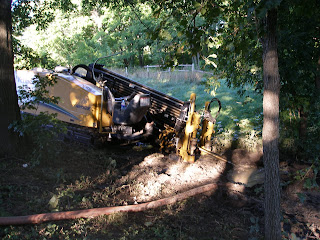2010
Wow, its January.
Next month we start planting the seeds for the garden.
Peppers and Tomato starters.
I have been working on some final school papers and projects and start a new term on the 4th.
The snow is drifting over the late fall swales I put in. The opening in the wind break is pouring stripes of show across the hill. If the snow is collecting there on a windy day it would seem the moisture would be focused there too by the wind of a rain storm. Now the ground is frozen and the gutter-like swales collect snow and ice as the freeze/thaw continues. Its great to see them puddle up in the spring and as the ground thaws, release the water to the waiting roots of spring. This surely is the solution to flood and erosion. Keep the water on the land as long as possible and let it come out in springs and aquifers. Swaled fields would absorb the moisture of any season and charge the land with drought proofing life.
The Koi are slumbering in frigid water at the bottom of our rain pond. A small aerator keeps the gasses from accumulating. The water is very low and around February I will pump some fresh water in to raise the level. We are thinking of trying some Tilapia next season.
The wetland edges are prime for some Siberian Pine Nut trees. I am making plans to build guilds with them in the rich soil Northwest of our house. We need more protein and oil seeds. Fruit we got. But a rounded diet will be important in the future.
I am reading books about Native American agriculture. Fascinating practices they had for thousands of years that brought us many of the foods we have today. Know what they grew is great, but how they grew it is even more important. Zuni, Hopi, Navajo, Hidatsa, Ojibwe, Dakota, and Wampanoag all solved the issues of growing food in wildly different weather patterns and soil conditions. A previous entry talk about that. There is so much to it however. Native Science and Walking in Beauty hold many solutions through observation and the obligation that comes with knowing. Coming to Know is the acquisition of knowledge and the appropriate technology to use with that knowledge. Game placation and reciprocity ensures the stability of resources by respecting all natural resources, animal and plant, soil and water.
We ask permission to take and give back a portion in gratitude. We do not stand with our fists on our hips or arms folded on our chests and gaze in domination. We lower to our knees, feel the grass, smell the soil and ask what the land has in store for us. We open our eyes like those of a child, willing to learn.
Next month we start planting the seeds for the garden.
Peppers and Tomato starters.
I have been working on some final school papers and projects and start a new term on the 4th.
The snow is drifting over the late fall swales I put in. The opening in the wind break is pouring stripes of show across the hill. If the snow is collecting there on a windy day it would seem the moisture would be focused there too by the wind of a rain storm. Now the ground is frozen and the gutter-like swales collect snow and ice as the freeze/thaw continues. Its great to see them puddle up in the spring and as the ground thaws, release the water to the waiting roots of spring. This surely is the solution to flood and erosion. Keep the water on the land as long as possible and let it come out in springs and aquifers. Swaled fields would absorb the moisture of any season and charge the land with drought proofing life.
The Koi are slumbering in frigid water at the bottom of our rain pond. A small aerator keeps the gasses from accumulating. The water is very low and around February I will pump some fresh water in to raise the level. We are thinking of trying some Tilapia next season.
The wetland edges are prime for some Siberian Pine Nut trees. I am making plans to build guilds with them in the rich soil Northwest of our house. We need more protein and oil seeds. Fruit we got. But a rounded diet will be important in the future.
I am reading books about Native American agriculture. Fascinating practices they had for thousands of years that brought us many of the foods we have today. Know what they grew is great, but how they grew it is even more important. Zuni, Hopi, Navajo, Hidatsa, Ojibwe, Dakota, and Wampanoag all solved the issues of growing food in wildly different weather patterns and soil conditions. A previous entry talk about that. There is so much to it however. Native Science and Walking in Beauty hold many solutions through observation and the obligation that comes with knowing. Coming to Know is the acquisition of knowledge and the appropriate technology to use with that knowledge. Game placation and reciprocity ensures the stability of resources by respecting all natural resources, animal and plant, soil and water.
We ask permission to take and give back a portion in gratitude. We do not stand with our fists on our hips or arms folded on our chests and gaze in domination. We lower to our knees, feel the grass, smell the soil and ask what the land has in store for us. We open our eyes like those of a child, willing to learn.

Comments